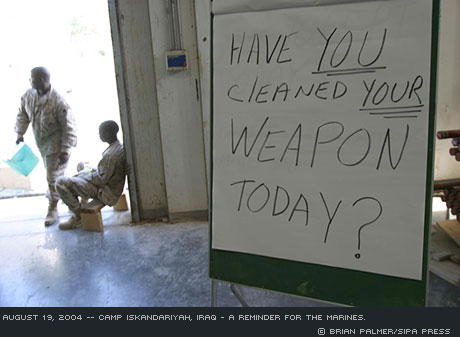|
|
 |
EPILOGUE
All told, I spent about seven weeks with various elements of the 24th
MEU. I was expecting plenty of rah-rah triumphalism and USA-first
hyperpatriotism but found only a little, not a lot. There were a few
folks who hooted at John Kerry when he appeared on the chow hall's
TV screen, and then cheered when Bush came on. "John Kerry is
a fucking communist" for tossing his Vietnam War ribbons, asserted
a cocky young Marine from Arkansas, Corporal Michael Euler, a soon-to-be
father who knows what he knows and will tell you so in a heartbeat.
There was the major who paused mid-sentence when a US fighter jet
flew overhead. "You hear that," he asked me. "That's
the sound of freedom." More than a few Marines I spoke with,
however, accepted without question the Bush administration's casus
belli for going into Iraq -- the 9-11 connection with Saddam Hussein’s
government and the alleged weapons of mass destruction -- an argument
I do not buy.
But I found as many quiet skeptics, like the senior noncommissioned
officer who shared the theory that the Marines are simply "cheap
security" for the plethora of American defense contractors working
in Iraq like Bechtel, Titan International, and KBR. Or the lieutenant
who told me: "We came into someone else's neighborhood and are
trying to tell them how to run it." Most of the grunts I spent
time with didn't speak in terribly political or philosophical terms:
they talked about getting their job done, keeping fellow Marines safe,
and heading home to their loved ones.
It has been difficult to find venues for these stories and photos.
They are quieter, more mundane and subtle than, for example, the graphic
coverage of the fighting in Najaf. Gauging the progress of nation-building
is difficult, time-consuming, expensive, beige. Flying bullets and
screaming protesters provide ready-made drama for networks and newspapers
that compete moment to moment for consumers' attention. It may seem
counterintuitive, but it's less risky from an economic standpoint
(though not from a personal one, as is the case with Najaf) to cover
the story everyone else is covering. The very presence of the media
transforms an event into news. Their absence, well...
Will the media start measuring the progress in Iraq, both in fighting
the militants and nation-building, against the administration's promises?
Will the Iraq story evaporate as Afghanistan did (as well as Haiti
and Somalia and Liberia), or will Americans begin to demand accountability
for this open-ended effort, which costs lives and limbs, Iraqi and
American, every month, and billions of dollars? Will citizens, myself
included, press both presidential candidates for their one-, two-,
and five-year plans for Iraq? I'm skeptical, but not without hope.
I am thinking less about politics and more about the people I leave
behind in Iraq as I return home to New York -- and to the Republican
Convention that my city is hosting. I hope the 24th MEU's remaining
months pass quickly and that the Marines return safely, proud of their
efforts. For citizens of Northern Babil and all of Iraq, I hope for
a durable peace -- and a truly multinational commitment to attain
it -- upon which they can build the nation they want.
Brian Palmer
Camp Doha, Kuwait
|
 |
|
| This
is Brian Palmer's final installment of his 'Digital Diary: Witnessing
the War.'" Other photo essays by different authors on various
aspects of the War in Iraq and the political situation in the USA
will follow as part of the "Democracy in America" series. |
|

